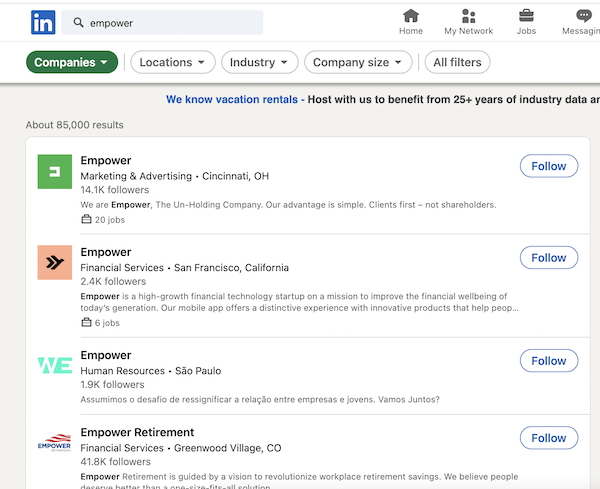
Empower.com is an exceptional domain name, and it is quite valuable. In fact, I made at least a couple of efforts to acquire this one word .com domain name. As you can see in the image above, there are tens of thousands of company listings on LinkedIn for a search of “empower.” According to DomainTools, there are 332 domain names currently registered with Empower as the sole keyword, and more than 63,000 domain names are registered that have “empower” in them.
I believe “empower” is a meaningful and descriptive word, and Empower.com would have substantial value to many companies.
According to an article in Bloomberg Law (subscription required), a Anti-Cybersquatting Consumer Protection Act (ACPA) lawsuit was filed against the registrant of Empower.com by a company that operates a subsidiary called Empower Retirement, LLC. According to the lawsuit (which can be accessed via CourtListener), “Plaintiffs launched the EMPOWER Brand nationwide in the fall of 2014.” Empower.com has a creation date of July 26, 1994. In fact, the plaintiff conceded that the defendant owned the domain name long before its brand was created:
“On information and belief, on July 26, 1994, a third party registered the Empower Domain. On information and belief, sometime between July 1994 and March 2002, the Empower Domain was transferred to Defendants, and thereafter has reflected Defendant Empower Geo and/or Defendant Machinis as the registrant of the Empower Domain.”
It should be noted that one of the defendants in this lawsuit is a company called Empower Geographics, Inc.
From what I understand, the plaintiff in the lawsuit tried to acquire Empower.com, but the domain registrant’s “multi-million dollar purchase price” was deemed too high in the opinion of the plaintiff. The plaintiff also believes the defendant was targeting it as a prospective buyer. In the lawsuit, the plaintiffs claim, “Defendants are not using the Empower Domain for any legitimate business-related function (and have not in over five years) and are simply engaged in the textbook definition of cybersquatting.”
You should note that a cybersquatting lawsuit is different than a UDRP filing. In the UDRP, the complainant would need to prove that the registrant registered and used the domain name in bad faith. Since the plaintiff conceded that the registrant registered the domain name prior to its existence, that would have been impossible to prove. In a cybersquatting lawsuit, the requirements are a bit different.
When the plaintiff launched its Empower Retirement brand, it did so knowing another entity owned the Empower.com domain name. It also knew there were many other brands that had Empower in it.
When you visit Empower.com, there are no pay per click links to competitors or anything else that would mislead customers into thinking they are on Empower Retirement’s website or another company with Empower in branding for that matter. In fact, the landing page makes it clear that Empower.com is for sale rather than try to confuse people who navigate there:

That being said, I think this could be considered reverse domain name hijacking, and I would not be surprised if the defendant countersues the plaintiff seeking damages.
In my opinion, the registrant of a descriptive domain name is well within its right to maximize the value of the domain name. Empower.com is not valuable simply because of the plaintiff’s brand. I think Empower.com is valuable because it’s a strong keyword that is used by many brands. If I owned the domain name and was willing to sell it, I would be asking for seven figures.



Hi. If empower.com had expired and won by a domainer and if he put it for sale and in the process he contact all prospective buyers and then if that contacted prospective buyer brings cybersquatting case or udrp then will all this diminish the prospects of auction winner defending his domain name. In this process domainer keep dan landing pages , removing all paid links and all.
I remember someone won udrp where judge said that buying And selling is a legitimate business.
As the domain got expired And auctioned again , it’s registration date will become most recent than all other businesses operating by the same name of Domain from their date of existence. May I ask how Judge decides on date of registration for a expired domain name which gets new registration date.
ICANN needs to step up and add an penalty for RDNH, otherwise why not spent $5k and see if you get lucky.. Big reward, No risk but a slap on wrist and maybe get on Ricks board.. It’s becoming a daily thing now to attempt this theft and continue abusing the ICANN/WIPI legal system.. This is the NUMBER 1 risk, in my opinion, to owning domains and spending wasted money defending assets. 20 plus years of the same abuse, why does goes ICANN get $65 +million year again?
Heartily agree. ICANN needs to step the f**k up. This is a (presently) legitimized scam ironically, you are right at $5k you can end up with a pretty cool domain name. Dang. Just realized that for $5k you might also get more news coverage and exposure for your scammy startup that way…
Agree. ICANN should require at least a $20,000 cash deposit or bond in order to challenge domain ownership. If RDHN is found, the money is paid to the challenged domain owner. And throw in attorney fees as well.
Has nothing to do with ICANN, it is a lawsuit.
WOW,,,, can’t believe it wasn’t already taken,,, and I GOT IT. Watch out, here comes EMPOWERMYASS.COM
Let’s see if it is true that they said they would sell it to their competitors and “professional cybersquatters”, if the allegations are true they could potentially lose the name. The lander really isn’t great and the more I look into it the less optimistic I am for the owner.
This normally would be a slam dunk to defend but I suspect they will now have their work cut out because of overly aggressive marketing.
If this were UDRP I’d actually argue that there’s a greater chance for Empower Retirement, but the worst of the accusations here is the threat to sell to one of their competitors. Which, let’s be honest, sounds sooooo likely to be the work of a domain broker as compared to the company that’s owned the domain for 15+ years. Even if it is not, I still don’t think it matters.
Because this is just a regular old lawsuit, and the judge presiding over the case will likely be familiar with a lot of civil business litigation. As such, she or he will know that companies threatening to sell something to another companies competitor, is common. This may have worked within UDRP, but not within a lawsuit.
They probably went with lawsuit over UDRP because they know that it’s ultimately going to end up in front of a US court even if they were to receive a victory with UDRP.
I think that Empower Retirement is going to have a hard time explaining why they’ve not bothered to do anything about EmpowerRetirement.com, which is far more likely to receive customer emails and spillover traffic, as compared to Empower.com. That domain, is redirecting to a bitcoin exchange!
Complicating matters more, is the fact that Empower Retirement signed a deal reported to be worth $5M a year for the naming rights for Empower Stadium (formerly Mile High Stadium).
It’s going to be difficult for them to explain why they understand why there’s a $5M annual cost to naming rights for a building, and in this case, being able to to be known as “Empower” by paying to have Mile High Stadium changed to “Empower Stadium” and not “Empower Retirement Stadium”.
Domain ownership and the resale of domains has already been upheld multiple times as being a legitimate business practice in US courts as well as within UDRP proceedings.
This should get tossed if the domain owner has knowledgable counsel.
In a UDRP, the complainant would be required to prove the domain name was registered and is being used in bad faith. Given the domain name was registered by the current owner and defendant many years before the plaintiff existed as Empower Retirement, the case would have been dead on arrival. As I mentioned, the plaintiff even cited the fact that the domain name was registered by the defendant long before the plaintiff had a company called Empower Retirement.
FWIW, the ICA was instrumental in getting the retroactive bad faith theory removed from UDRP discussions. This means, a complainant can not successfully say that a renewal of a domain name counts as a new registration: https://domaininvesting.com/ica-successfully-advocates-discredit-dangerous-retroactive-bad-faith-theory-udrp/
Put simply, this case would have been DOA if it was a UDRP and would likely have resulted in RDNH. If the company wished to pursue further, it would have ended up in a lawsuit which is where we ended up anyway.
No way would RDNH have been found and that would send a very poor message.
I suspect it is 50/50 whether the owner is going to lose this name.
There is definitely some form of infringement here in my view. The name is being used in bad faith because they are collecting this co’s misdirected emails and using it as a negotiation factor, plus a bunch of other sleazy strategies to try to get this co to buy it. They have added to the confusion quiet deliberately in my view.
The fact that the domain name was registered by the current owner before the plaintiff existed means the UDRP should fail unless a panelist goes rogue. It’s simply not possible to register a domain name in bad faith before a complainant existed without a time machine. Filing a UDRP, with counsel, that is faulty in this manner, should be RDNH. This is all speculation though since a UDRP was not filed. Perhaps this was the reason.
I don’t like the idea of collecting emails. It’s one thing if the domain name is being used for a business and emails are accidentally received, but I think it’s different (and risky) to turn on catch all-emails for the sake of seeing what comes in. I’ve shared my feelings on this in the past:
“I don’t love the idea of setting up a catch all email address”
https://domaininvesting.com/catch-all-email-pitch-leads-to-losing-udrp/
“I do not turn on email for domain names I am not using, and in general, I think it is a bit slimy and possibly unethical/illegal to turn on a catch all email with the intention of telling an intended recipient I am getting their email.”
https://domaininvesting.com/knowing-when-to-cut-bait/
That being said, we do not have a response from the defendant yet to understand his perspective. The filing is obviously one sided and we will learn more from subsequent filings and responses.
You seem to be arguing that if someone can’t prove an element it must be RDNH, that is not how it works.
This is not some meritless case, totally different to a situation where RDNH may be found.
James Iles reported that the domain name transferred to CSC: https://jamesnames.com/2021/12/csc-client-acquires-empower-com/
It appears that this lawsuit has been settled: https://domaininvesting.com/empower-com-lawsuit-settled/